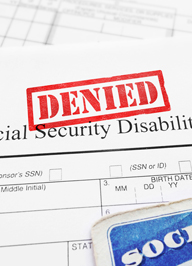Free Case Evaluation
You will never be charged a fee unless a recovery is made for you.
Receiving a denial for your Social Security Disability Insurance (SSDI) application can feel overwhelming and final. But it is not. Appealing a Social Security Disability denial offers a clear path to fight for the benefits you deserve. With only about 38 percent of initial SSDI applications approved by the Social Security Administration (SSA), many applicants must navigate the appeal process to secure financial support. This guide details the four levels of appeal, how to file, and key strategies to improve your chances of success when appealing a denial.

The SSA denies SSDI applications for several reasons, which are outlined in your denial letter:
Understanding the specific reason for your denial is crucial to planning an effective appeal. Over 53 percent of applicants who appeal are ultimately approved, making persistence critical.
The process for appealing a Social Security Disability denial includes four stages, each with a 60-day filing deadline (plus 5 days for mailing) from the date you receive the SSA’s decision. Missing a deadline may require restarting your application, potentially losing back pay. Follow each step until you receive approval or have exhausted all four steps.
Hiring a disability attorney can significantly enhance your chances of success, especially at the ALJ hearing stage. Attorneys work on a contingency basis, meaning they only get paid if you win. The SSA regulates fees, limiting them to 25 percent of your past-due benefits (back pay), capped at $9,200 for cases decided on or after November 30, 2024. For example, if your back pay is $20,000, the attorney receives $5,000; if back pay is $40,000, the fee is capped at $9,200. The SSA withholds and pays the fee directly to your attorney, so there are no upfront costs. In rare cases, such as federal court appeals, attorneys may file a fee petition to exceed the cap, subject to SSA approval. Discuss any additional costs (e.g., medical record fees) upfront to avoid surprises.
Appealing a Social Security Disability denial is a structured process with four levels—reconsideration, ALJ hearing, Appeals Council review, and federal court—designed to give you multiple chances to secure SSDI benefits. By gathering strong medical evidence, meeting deadlines, and considering professional representation, you can significantly improve your odds. With 53 percent of appeals succeeding, taking action to appeal a Social Security Disability denial is a critical step toward obtaining the financial support you need.
Sources
You will never be charged a fee unless a recovery is made for you.